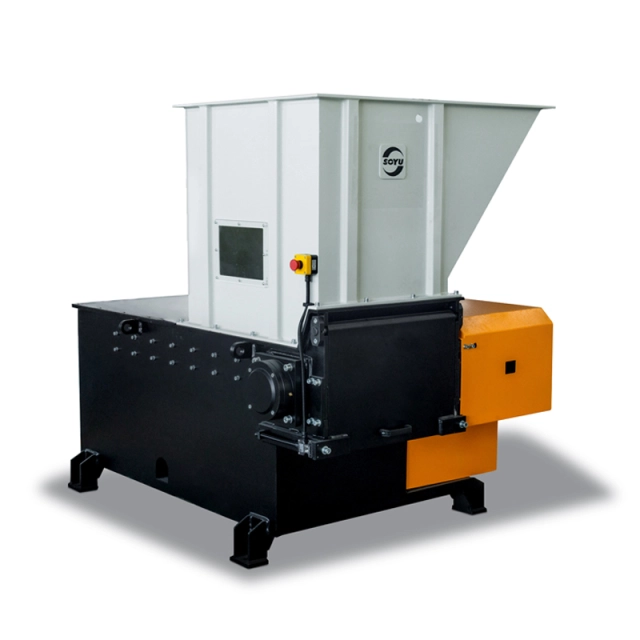Single shaft shredder have revolutionized the waste management industry, offering an efficient solution for handling waste and improving sustainability. For industries tackling significant amounts of waste, these shredders—designed by leading **single shaft shredder manufacturers**—provide a reliable way to reduce volume and support recycling efforts, all while minimizing environmental impacts. This blog will explore the key industries benefiting from single shaft shredders, their integration into waste management systems, environmental considerations, and real-life applications.
Table of contents:
Key Industries Benefiting from Single Shaft Shredders
How to Integrate Shredders into a Waste Management System
Case Studies on How Shredders Have Improved Waste Handling
Understanding the Environmental Impact and Regulatory Requirements
Key Industries Benefiting from Single Shaft Shredders
Single shaft shredders are robust and versatile, making them indispensable across multiple industries. Manufacturing plants use these machines to recycle plastic lumps, PET, and ABS, while construction industries rely on them to shred materials like wood and glass fiber. The medical sector leverages these machines for shredding medical waste to ensure safety and compliance. Additionally, municipal solid waste (MSW) processing plants employ single shaft shredders to handle RDF efficiently.The adaptability of single shaft shredders enables them to process various materials, including electronics, metals, and textiles. With a “V” arrangement rotor and wear-resistant blades, machines like the SR Series offer durability while delivering precision in size reduction, crucial for these different sectors. For businesses, this technology helps meet industry-specific waste regulations while reducing overall waste disposal costs.
How to Integrate Shredders into a Waste Management System
Integrating a single shaft shredder into a waste management system requires a strategic approach. The first step is understanding your waste stream, identifying the types of materials you need to process, and determining the shredding capacity required. Working with a reputed single shaft shredder supplier ensures that the choice of equipment aligns with your facility's unique needs.Furthermore, positioning the shredder correctly within the workflow can optimize waste handling. These machines often precede other processing equipment like granulators or balers in recycling facilities. By incorporating adjustable fixed blades and intelligent hydraulic control, single shaft shredders ensure seamless integration with existing systems. From pusher systems that handle bulky materials to automated safety features in screen units, each aspect of these shredders is designed to deliver efficiency and reliability.Finally, training staff on operating and maintaining the shredders is vital for long-term success. Proper maintenance, such as inspecting blade wear or checking the hydraulic system’s cooling, ensures the machinery continues to perform at peak levels.
Case Studies on How Shredders Have Improved Waste Handling
Several industries have demonstrated how single shaft shredders have transformed waste management processes. For instance, a leading supplier in the beverage industry integrated a single shaft shredder to recycle plastic bottles effectively. The company noted a 30% reduction in waste processing costs while meeting sustainability targets.Another example comes from an electronics recycling plant that used shredders to process end-of-life devices. With the ability to separate valuable metals from e-waste, the facility not only reduced landfill contributions but also generated additional revenue streams by selling recycled materials.Similarly, a municipal waste processing center successfully implemented this technology for handling RDF. By using specially designed screens, they achieved consistency in particle size, greatly improving the efficiency of subsequent incineration processes. This case highlights how single shaft shredders are pivotal in energy recovery projects.
Understanding the Environmental Impact and Regulatory Requirements
Using single shaft shredders promotes sustainable waste management practices by reducing material volume and facilitating recycling. For businesses, these machines ensure compliance with waste disposal regulations, helping avoid hefty fines and reputational damage. Furthermore, the shredding process contributes to lowering carbon footprints by decreasing the volume of waste sent to landfills and promoting resource recovery.Environmental regulations, such as those focusing on electronic waste or medical waste, often mandate specific measures for proper disposal. Single shaft shredders, equipped with robust features like intelligent hydraulic control, enable facilities to comply with such regulations effortlessly. By producing consistent and small particle sizes, these machines optimize the recycling and processing of waste into reusable forms.Additionally, manufacturers of single shaft shredders are prioritizing eco-friendly solutions, such as incorporating energy-efficient motors and cooling systems to reduce energy consumption.
Single shaft shredders have become a critical component in modern waste management, benefiting diverse industries like manufacturing, construction, and municipal waste handling. They help businesses comply with regulatory requirements, optimize recycling processes, and contribute to sustainability goals. Whether you’re looking for an RDF shredder or exploring solutions for diverse material reduction, a trusted single shaft shredder manufacturer can deliver tailored solutions to meet your needs.For industries seeking to optimize their waste handling systems, integrating single shaft shredders represents a forward-thinking step toward efficiency and environmental responsibility. To learn more about these powerful shredders and how they can elevate your waste management strategy, contact a leading single shaft shredder supplier today.

No comments:
Post a Comment